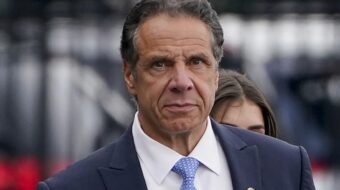
LOS ANGELES — The largest hunger strike in U.S. history will begin Oct. 15, to call attention to voter mobilization, immigrant rights organizers say. One hundred dedicated activists will encamp at the historic heart of Los Angeles — La Placita Olvera — to fast for 21 days before the Nov. 4 elections. They expect to be joined by thousands across the country who will fast for at least one day and dedicate themselves to building a massive voter turnout.
The fast dramatizes a nationwide pledge/petition effort aiming to gather 1 million people committed to “vote for immigrant rights, fast at least one day, recruit five family and friends to sign the pledge and take action to hold the new administration accountable for our votes.”
Conceived in the nonviolent action tradition of civil rights leader Martin Luther King and farm labor leader Cesar Chavez, the “Fast for our Future” (fastforourfuture.com) is organizing online, by word of mouth and through social, cultural and political networks. It is closely tied to civil rights, labor, religious groups and coalitions that support immigrant rights.
The fast is being initiated by Rise, a movement of immigrants rights leaders and advocates which focuses on nonviolent action to confront the escalation of anti-immigrant raids, deportations and other repressive Bush administration measures. Endorsers include Dolores Huerta, co-founder of the United Farm Workers union; Maria Elena Durazo, leader of the Los Angeles County Federation of Labor AFL-CIO; the Coalition for Humane Immigrant Rights of Los Angeles (Chirla); Hermandad Mexicana Transnacional, Clergy and Laity United for Economic Justice; Institute of Popular Education of Southern California; and the Korean Resource Center.
Angelica Salas, director of Chirla, said at an Oct. 1 press conference here, “The raids will continue and will keep on going if we do not unite, do not vote and do not keep putting on pressure. There is one choice: remain silent without taking action, or unite, fast and vote.”
Referring to deportation raids carried out during the previous three weeks in California, in which 1,150 immigrants were arrested, L.A. labor leader Durazo said, “We cannot abandon the thousands of children separated from or deported with their parents.”
Some 5 million children in the United States have at least one undocumented parent. Most of these children are U.S. citizens.
The Bush administration’s record of immigrant repression is chilling. In recent years the federal Immigration Control and Enforcement agency (ICE) has steadily increased raids and deportations, reaching a record 276,912 in 2007. ICE’s Fugitive Operations Teams have increased from 18 in 2005 to 50 in 2006 and 75 in 2007. Detentions have increased from 5,532 in 1994 to 27,500 in 2007. The number of anti-immigrant hate groups and anti-Hispanic hate crimes has steadily grown.
However, the transition of the immigrant rights movement from marching to voting is also on the rise. In the 2006 elections, many anti-immigrant Republican congressional candidates were defeated in large part due to greater Latino voting. Immigration is an important issue to Latino communities across the country.
In this year’s presidential primaries, the Latino vote more than doubled, with big increases in votes for Democrats and rejection of Republicans. Massive citizenship and voter registration drives are expected to increase the national Latino turnout from 7.6 million in 2006 to 9.3 million or more this year. Many predict that record get-out-the-vote efforts, especially with initiatives like this month’s fast, could result in over 10 million Latino voters who favor Democrats over Republicans by more than 2-1. The Democratic Party platform supports legalization and due process, while the Republican Party platform opposes legalization and supports greater repressive enforcement.
The Fast for our Future is nonpartisan and leaves it to people to check out the positions and actions of the candidates. It stresses the issues and the importance of voting. Organizers say that for anti-immigrant groups the issue of immigration is primarily ideological, but for the immigrants, their families, communities and co-workers it is a matter of day-to-day survival.
rosalio_munoz @sbcglobal.net









